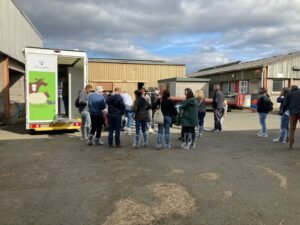– by F. Kenyon (MRI)
Our first face-to-face meeting since the project began happened in September 2022. As part of the meeting participants visited the pilot farm at the Moredun Research Institute. Over 35 people from the 19 consortium partners from the UK (MRI), France (IDELE, CNBL, INRAe, PageUP, Agdatahub), Italy (AGRIS, EAAP, Abinsula), Israel (ARO, Spark), Norway (NIBIO), Spain (UAB, Oviaragon), Greece (ELGO-DIMITRA) and Romania (BUAS), led by SRUC (UK), visited the pilot farm to see the work that has been undertaken to develop early warning systems to improve animal welfare. MRI’s research farm near Edinburgh is a typical lowland UK farm, with mule x Texel sheep on a pasture-based system. The studies at MRI have focused on naturally occurring welfare issues in grazing meat ewes and lambs, mainly gastrointestinal parasitism, lameness and mastitis. Visitors saw the range of technologies that have been tested on the farm, which include using an EID weighcrate to monitor growth rate and identify lambs that need worming, using proximity loggers to monitor ewe:lamb bond and social structure and accelerometers to look at behaviour change linked the various welfare challenges. In order to validate the information from the technology with any welfare issues identified, individual and in-field welfare behavioural assessments are carried out regularly. In addition, clinical data such as faecal egg counts (to monitor parasite challenge) and somatic cell counts (to detect mastitis) have been monitored. The intention is that all of this data can be brought together to identify suitable early warning systems for grazing sheep. Have a look at the video presentation made by Aimee Walker!


© Photos Jade Duncan

